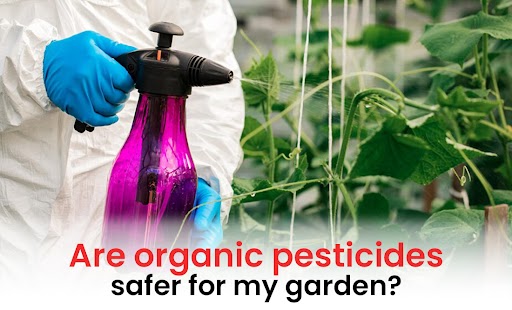
Are organic pesticides safer for my garden?
Many gardeners wonder if organic pesticides are a safer choice for their gardens. In simple terms, organic pesticides are made from natural ingredients like plants and minerals, rather than synthetic chemicals. They aim to control pests while being less harmful to the environment and human health. While they're not perfect, organic pesticides offer a promising alternative for those who prioritize eco-friendly gardening practices. This introduction sets the stage for exploring the benefits and considerations of using organic pesticides in your garden, ultimately helping you make an informed decision about pest management methods.
What is an Organic Pesticide?
These days, more people are trying to be eco-friendly and avoid harsh chemicals. They care about the environment and their health. But they still need to get rid of bugs and weeds. That's where organic pesticides come in.
Organic pesticides are made from natural stuff like plants and minerals. They can kill pests without being as harmful as synthetic pesticides. They're not perfect, but they're a better choice for our planet and our health. Choosing organic pesticides helps us move towards a greener and safer future.
How to Use Insecticide?
Using insecticide effectively requires following proper safety precautions and application techniques. Here's a general guide on how to use insecticide:
Choose the Right Insecticide: Select an insecticide that is appropriate for the target pests and the area you want to treat. There are different types of insecticides available for various pests and environments (e.g., indoors, outdoors, gardens, crops).
Read the Label: Carefully read and follow the instructions on the insecticide label. The label provides essential information such as the application rate, mixing instructions, safety precautions, and any special considerations.
Wear Protective Gear: Before handling insecticide, put on appropriate protective gear such as gloves, long-sleeved shirts, long pants, closed-toe shoes, goggles, and a mask to prevent skin contact, inhalation, or eye exposure.
Prepare the Solution: Mix the insecticide according to the instructions on the label. Use the recommended dilution ratio and ensure thorough mixing. If using a concentrate, measure the appropriate amount and mix it with the required volume of water in a sprayer.
Choose the Right Equipment: Select the appropriate application equipment based on the type of insecticide and the area to be treated. Common options include handheld sprayers, backpack sprayers, foggers, or dusters. Make sure the equipment is clean and properly calibrated.
Apply at the Right Time: Apply insecticide when the target pests are most active, typically early in the morning or late in the evening. Avoid windy conditions to prevent drift and ensure proper coverage.
Apply Evenly: Apply the insecticide evenly over the target area, ensuring complete coverage of surfaces where pests are likely to be present. Pay attention to cracks, crevices, and other hiding spots.
Follow Safety Precautions: Take precautions to avoid contact with the insecticide during and after application. Keep children and pets away from treated areas until the insecticide has dried or as instructed on the label.
Clean Up: After application, clean and properly store the application equipment. Dispose of any leftover insecticide or empty containers according to local regulations.
Monitor Effectiveness: Monitor the treated area for pest activity following application. Reapply insecticide as needed according to the label instructions, and consider alternative pest management methods if necessary.
Benefits of Organic Pesticides
Organic pesticides offer several benefits compared to synthetic alternatives:
Safer for Health: Organic pesticides are typically less toxic to humans and animals than synthetic pesticides. They often pose lower risks of harmful effects such as skin irritation, respiratory issues, or long-term health concerns.
Environmentally Friendly: Organic pesticides are derived from natural sources and often break down more quickly in the environment. They are less likely to accumulate in soil, water, or air, reducing the risk of pollution and harm to non-target organisms like beneficial insects, birds, and mammals.
Reduced Chemical Residues: Organic pesticides leave behind fewer chemical residues on treated crops or in the soil. This can lead to cleaner produce and a healthier ecosystem overall.
Long-Term Sustainability: Organic pesticides support sustainable agricultural practices by reducing reliance on synthetic chemicals. Over time, this can lead to healthier soils, improved water quality, and enhanced resilience to pests and diseases.
Compliance with Organic Standards: For organic farmers, using organic pesticides is often a requirement to maintain certification. These pesticides align with organic farming principles, which emphasize natural inputs and ecological balance.
Safe for Pollinators: Many organic pesticides are designed to target specific pests while minimizing harm to pollinators like bees and butterflies. This helps protect these essential insects vital for crop pollination and ecosystem health.
Organic pesticides offer a safer and more environmentally friendly option for managing pests in your garden. Derived from natural ingredients like plants and minerals, these pesticides are less harmful to both human health and the environment compared to synthetic alternatives. By choosing organic pesticides, you not only protect your garden but also contribute to a greener and healthier future for our planet.

